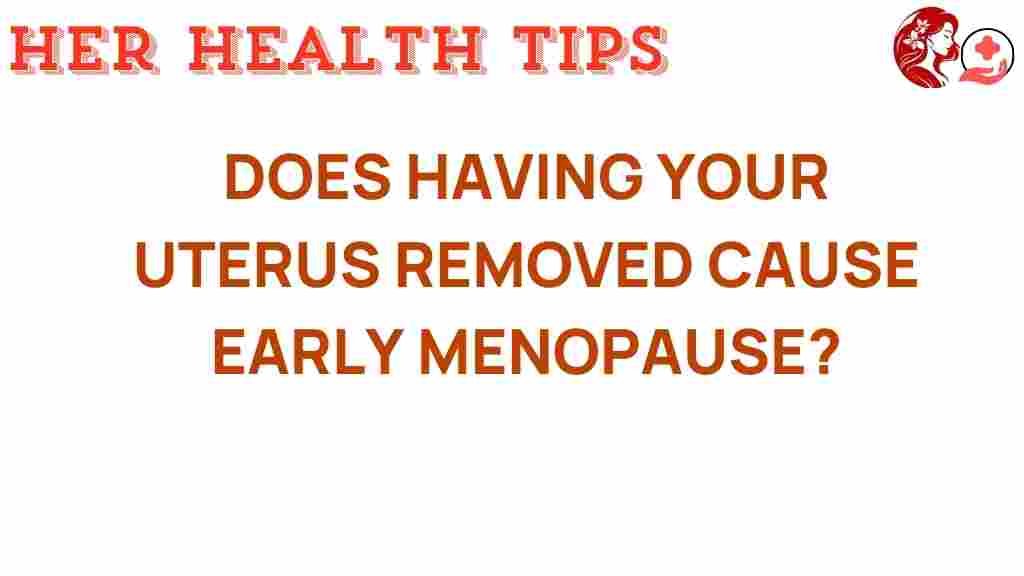Unraveling the Myth: Does Uterus Removal Trigger Early Menopause?
In the realm of women’s health, there are numerous misconceptions regarding reproductive health and menopause. One such myth that often surfaces is whether uterus removal, commonly referred to as a hysterectomy, triggers early menopause. This topic has stirred discussions and concerns among women who face the prospect of undergoing this surgery. In this article, we will explore the relationship between uterus removal and early menopause, clarify the hormonal changes involved, and debunk some prevalent medical myths surrounding this issue.
Understanding Hysterectomy and Its Types
A hysterectomy is a surgical procedure that involves the removal of the uterus. It may be performed for various reasons, including:
- Uterine fibroids
- Endometriosis
- Uterine prolapse
- Abnormal bleeding
- Cancer of the uterus or cervix
There are different types of hysterectomies:
- Total Hysterectomy: Removal of the uterus and cervix.
- Subtotal (or Partial) Hysterectomy: Removal of the uterus while leaving the cervix intact.
- Radical Hysterectomy: Removal of the uterus, cervix, surrounding tissue, and sometimes part of the vagina.
Hormonal Changes After Uterus Removal
One of the main concerns regarding hysterectomy is the potential for hormonal changes that can lead to menopause symptoms. It is important to distinguish between the physical removal of the uterus and the hormonal functions of the ovaries, which are responsible for producing estrogen and progesterone.
When only the uterus is removed, and the ovaries remain intact, women typically do not experience early menopause. The ovaries continue to function normally, producing hormones until they naturally decline with age. However, if both the uterus and ovaries are removed in a procedure known as a bilateral oophorectomy, early menopause can indeed occur. This is because the body loses its primary source of estrogen, leading to menopause symptoms.
Does Hysterectomy Cause Early Menopause?
To clarify, the answer to whether uterus removal triggers early menopause is nuanced:
- If only the uterus is removed, early menopause is unlikely.
- If the ovaries are removed alongside the uterus, early menopause is highly probable.
For many women, understanding this difference is crucial in making informed decisions about their reproductive health. It is essential to have a thorough discussion with a healthcare provider about the implications of the surgery being considered.
Menopause Symptoms: What to Expect
Women who undergo a hysterectomy may experience various menopause symptoms, especially if their ovaries are removed. Common symptoms include:
- Hot flashes
- Night sweats
- Vaginal dryness
- Mood swings
- Sleep disturbances
- Changes in libido
These symptoms can significantly impact a woman’s quality of life. It is vital to discuss potential treatments with a healthcare provider to manage these symptoms effectively.
Addressing Medical Myths Surrounding Hysterectomy and Menopause
There are many medical myths surrounding hysterectomy and early menopause. Some of the most common include:
- Myth 1: All women will go into menopause immediately after a hysterectomy.
- Myth 2: Hysterectomy is always performed with oophorectomy.
- Myth 3: Women who have had a hysterectomy cannot have a healthy sex life.
It is crucial to debunk these myths for better understanding:
- Not all hysterectomies involve the removal of the ovaries.
- Many women maintain their sexual health after hysterectomy.
- Menopause timing varies individually, regardless of hysterectomy status.
Step-by-Step Process of Preparing for a Hysterectomy
If you are considering a hysterectomy, here are the steps you should follow to prepare:
- Consultation: Schedule a detailed consultation with your healthcare provider to discuss symptoms, diagnosis, and treatment options.
- Understand the Procedure: Learn about the type of hysterectomy recommended and whether it includes ovary removal.
- Discuss Hormonal Therapy: Talk about potential hormone replacement therapy (HRT) options if ovaries are removed.
- Prepare for Recovery: Plan for post-operative care, including physical activity restrictions and follow-up appointments.
- Emotional Support: Consider joining support groups or counseling if you feel anxious about the surgery.
Troubleshooting Tips for Managing Menopause Symptoms
If you experience menopause symptoms after a hysterectomy, here are some tips to help manage them:
- Consult a Specialist: Speak to a healthcare provider about tailored treatment options.
- Consider HRT: Hormone replacement therapy may alleviate symptoms.
- Diet and Exercise: Maintain a healthy diet and regular exercise routine to support overall wellness.
- Stay Hydrated: Drink plenty of water to help with hot flashes and dryness.
- Mindfulness and Relaxation: Practice stress-reducing techniques such as yoga, meditation, or deep breathing exercises.
Conclusion
In conclusion, the relationship between uterus removal and early menopause is a complex one. While hysterectomy can lead to early menopause if the ovaries are also removed, it does not automatically do so when only the uterus is taken out. Understanding the facts surrounding hysterectomy and its implications on hormonal changes is essential for informed decision-making regarding women’s health and reproductive health.
By debunking medical myths and acknowledging the realities of menopause symptoms, women can better prepare for their surgical journey. If you have more questions about hysterectomy and early menopause, consider consulting with a healthcare professional. For further information on women’s health, visit this resource. Remember, being informed is the best way to navigate your health journey.
This article is in the category Reproductive and created by HerHealthTips Team
